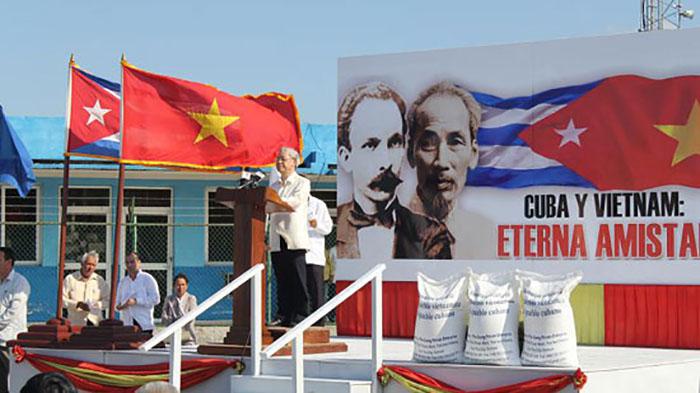Vietnam and Cuba: Examples of what socialism can achieve
Cuba and Vietnam, separated by thousands of kilometers and with different historical and cultural realities, are examples of the successes of socialism, when it is defended and built with the support of the majority of the people.
 |
General Secretary of the Vietnamese Communist Party, Nguyen Phu Trong, visited Cuba to strengthen the close ties of friendship shared by the two nations. Photo: VNA
Cuba and Vietnam, separated by thousands of kilometers and with different historical and cultural realities, are examples of the successes of socialism, when it is defended and built with the support of the majority of the people.
Led by Ho Chi Minh, Vietnamese patriots drove out the European colonizers and then defeated the United States Army, the most powerful in history.
Later they reunified the nation and raised one of the most powerful economies of Southeast Asia from the ashes left by the U.S. Air Force.
Vietnam, like Cuba on the sands of Playa Girón (Bay of Pigs), showed that it was possible to defeat imperialism.
Since the time of José Martí, the resistance of its inhabitants was admired. “They fought, and they will fight again, the poor Annamites, those who live on fish and rice, and dress in silk, far away, in Asia, by the seashore, below China,” the Cuban Apostle wrote in The Golden Age children’s magazine.
Today, Vietnam faces other challenges to its development with equal determination, such as the accelerated industrialization of the country to guarantee its economic growth, and addressing certain social inequalities.
Cuba, on the other hand, is a symbol of resistance after more than half a century of attacks and blockade by the United States.
In the midst of this adverse context, exacerbated by the unilateral decisions of the current Republican administration, the island’s achievements are widely recognized in terms of guaranteeing its citizens basic rights, such as health and education, which remain a privilege in many other countries of the region.
Also, in the midst of economic difficulties, sectors linked to the knowledge society were promoted, such as biotechnology, which constitute important sources of income due to their high added value, and even attract the attention of developed nations.
Cuba is undergoing a process of updating its economy, without abandoning the essence of justice of the Revolution, but with the firm purpose of guaranteeing a prosperous and sustainable socialism for present and future generations.
Today, a turbulent period, in which the world faces serious challenges for peace, the ties of friendship between Vietnam and Cuba are examples for international relations.
In order to put economic relations on a level with the excellent state of political ties, the two states are working together to promote greater economic cooperation, favorable to Vietnam’s “Renovation” process, and the updating of the Cuban economic and social model.
Thanks to these joint efforts, this desire is gradually materializing. In the 35th Session of the Cuba-Vietnam Intergovernmental Commission, Cuban Minister of Foreign Trade and Investment, Rodrigo Malmierca, noted that Vietnam was the country's second most important trading partner in Asia and Oceania, and the tenth worldwide.
The minister welcomed the growing number of Vietnamese companies doing business with the island, already more than a hundred; and the progress of Vietnamese investments in various branches of the Cuban economy, such as construction, renewable energy, industry, tourism, and infrastructure.
But beyond the political and economic, the most important aspect for Cuba and Vietnam is their friendship, sealed almost half a century ago, when the Comandante en Jefe of the Revolution, Fidel Castro, stated: “For Vietnam we are ready to give even our own blood.” Although the current context is different, the affection of the Cuban people toward the Vietnamese remains the same./.
VNF/Granma
Recommended
 National
National
Shangri-La Dialogue 22: Vietnam Highlights Some Issues of Ensuring Stability in a Competitive World
 National
National
Vietnam News Today (Jun. 3): PM Pham Minh Chinh to Attend UN Ocean Conference, Visit Estonia, Sweden
 National
National
Vietnam News Today (Jun. 2): Vietnamese Trade Mission Sounds Out Business Opportunities in United States
 National
National
Vietnam News Today (Jun. 1): Vietnamese, Japanese Firms Foster Partnership
Popular article
 National
National
Vietnam News Today (May 31): Vietnam Strongly Supports Laos’s National Development
 National
National
Vietnam News Today (May 30): Vietnam, Venezuela Reinforce Ties Through People-to-people Diplomacy
 National
National
Vietnam News Today (May 29): Vietnam and Hungary to Expand Cooperation into New Areas
 National
National



